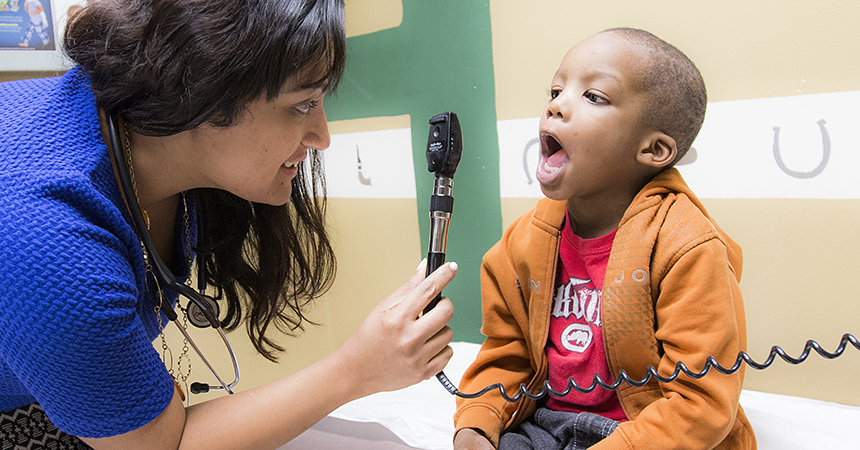TCOM students call struggling parents to help them cope during COVID-19 crisis
By Jan Jarvis
Infants, toddlers and teens are among the latest victims of Covid-19 as a spike in abuse cases triggers alarms across the country.
Unemployment, health worries, mounting bills, social isolation and closed schools – on top of potty training, tantrums and family tension – sometimes can push parents to the edge.
“There’s just a lot of stress going on in these households,” said Dr. Priya Bui, Assistant Professor in Pediatrics. “They’re desperate for help during the pandemic.”
To address child abuse concerns, pediatricians and Texas College of Osteopathic Medicine students are reaching out to families through phone calls and telemedicine visits. They are connecting them to licensed social workers, resources such as Healthy Steps specialists and even setting them up with telemedicine visits with a pediatrician. The Pediatric Mobile Clinic team is also contacting families and connecting them to resources.
Nationwide, there has been an increase in child abuse cases and deaths. In Fort Worth, Cook Children’s Medical Center had three deaths – all of them toddlers – from child abuse in one month when normally it is less than 10 for the year. They also have had 17 admissions.
About a dozen fourth-year TCOM students volunteered to make the daily phone visits as a way to address this issue and help families cope. The calls are designed to screen for signs of stress spiraling out of control, before it turns into abuse.
“A child abuser is not necessarily an obvious monster,” Dr. Bui said. “It’s someone who doesn’t have coping skills and is having a hard time dealing with so many stressors.”

These are difficult times for so many families, said Dr. Christina Robinson, Assistant Professor of Pediatrics.
“Most of our families need food and are concerned with paying for rent after decreased pay or lost jobs,” she said. “Families are feeling stressed and stretched thin between cooking, teaching school age children, assuming care of additional family members, and looking for help for their family.”
Pediatricians rely on routine or well-child visits, to look for stressors and psychosocial issues, but now they don’t have that opportunity, Dr. Bui said.
Many families just need a little reassurance, said Michael Petrus-Jones, a fourth year TCOM student who volunteered to make the daily calls. They seem so grateful to get their questions answered and know someone cares, he said.
Concerns about feeding and sleeping are common among the parents of two- to six-month-olds. Parents of toddlers are dealing with behavioral issues that are common among 18-month-olds to three-year-olds.
For some teens, the pandemic has triggered anxiety and depression, especially if they have suffered from mental health issues in the past.
Normally, teens can access many resources through their school, but now they’re struggling with loneliness and isolation, Dr. Bui said. Some are spending all day on social media. Others are anxious about doing schoolwork or depressed because they must miss milestones such as graduation.
“A lot of teens are cut off from friends, sports, a job, and that affects their mood,” Dr. Bui said. “All the things they rely on are out of their reach now.”
In some cases, medication might be needed or they may need their dosage increased.
The effort to reach out to families has been so successful that Dr. Bui said the outreach might continue it after the isolation eases.
Petrus-Jones said that talking with parents has had an impact on him as well.
“It’s been a big lesson in the power of empathy and compassion,” he said.







Social media